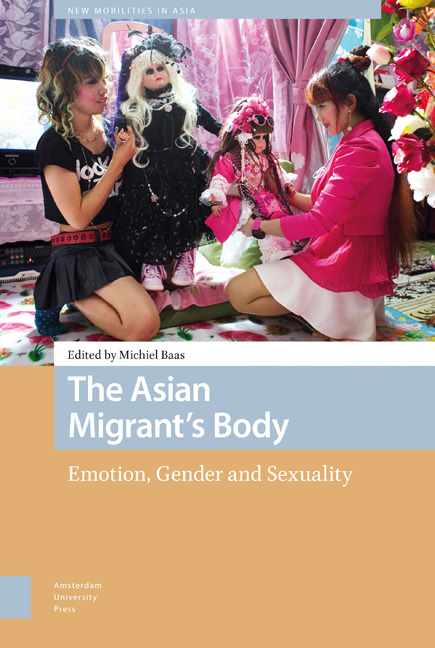Book contents
- Frontmatter
- Contents
- Introduction: Conceptualizing the Asian Migrant’s Body
- 1 ‘Not a Lesbian in Dubai, Not gay in Tehran’: Sexualities, Migrations, and Social Movements across the Gulf
- 2 Bodies at Work: Gendered Performance and Migrant Beer Sellers in Southeast Asia
- 3 Body, Space, and Migrant Ties: Migrant Domestic Workers and Embodied Resistances in Lebanon
- 4 The Day Off Policy , ‘Reverse Domestication’, and Emotional Labour among Indonesian Domestic Workers in Singapore: Maria Platt, Brenda S.A. Yeoh, Khoo Choon Yen, Grace Baey and Theodora Lam
- 5 Embodying the Good Migrant in Ageing: Negotiating Positive Subjectivities Through Paid Work
- 6 Proper Conjugation of Bodies: Chastity, Age, and Care Work in Sri Lankan Migrants’ Families
- 7 Border-crossing as Sexual Subjects: Interracial Dating Experience of Young Chinese in New Zealand
- 8 Managing Touch: The Racialized Dynamics of Intimacy in the Los Angeles Beauty Industry
- Notes on Contributors
- Index
2 - Bodies at Work: Gendered Performance and Migrant Beer Sellers in Southeast Asia
Published online by Cambridge University Press: 23 June 2021
- Frontmatter
- Contents
- Introduction: Conceptualizing the Asian Migrant’s Body
- 1 ‘Not a Lesbian in Dubai, Not gay in Tehran’: Sexualities, Migrations, and Social Movements across the Gulf
- 2 Bodies at Work: Gendered Performance and Migrant Beer Sellers in Southeast Asia
- 3 Body, Space, and Migrant Ties: Migrant Domestic Workers and Embodied Resistances in Lebanon
- 4 The Day Off Policy , ‘Reverse Domestication’, and Emotional Labour among Indonesian Domestic Workers in Singapore: Maria Platt, Brenda S.A. Yeoh, Khoo Choon Yen, Grace Baey and Theodora Lam
- 5 Embodying the Good Migrant in Ageing: Negotiating Positive Subjectivities Through Paid Work
- 6 Proper Conjugation of Bodies: Chastity, Age, and Care Work in Sri Lankan Migrants’ Families
- 7 Border-crossing as Sexual Subjects: Interracial Dating Experience of Young Chinese in New Zealand
- 8 Managing Touch: The Racialized Dynamics of Intimacy in the Los Angeles Beauty Industry
- Notes on Contributors
- Index
Summary
Abstract
Migrant beer sellers in Bangkok, Phnom Penh, and Vientiane engage in multiple contestations over bodily inscriptions, mobilizations, subjectivities, boundaries, and agency. Their bodies are subject to and shaped by the male gaze of recruitment agents, employers, and customers who can influence beer sellers’ incomes through the power they have to hire and place migrant workers in more or less popular venues, to control their movements and interactions with clients, and, to offer the prospects of patronage. Male customers often challenge bodily boundaries and integrity through unwanted touching, coercive sexual encounters, and encouraged co-drinking while, outside work, their social presentation is often judged as scandalous. These interactions work to shape and to reinforce the hegemonic gendered, racialized, and classed social order.
Keywords: migrant beer sellers, male gaze, recruitment agents, patronage>
Introduction
Migrant beer sellers are counted among the thousands of young women in Southeast Asia who are encouraged to move to urban centres for work or education and who are potentially excited by the possibilities of adopting an imagined ‘modern’ urban lifestyle. Notably, working as a beer seller is considered more lucrative and less demanding than factory labour (Phouxay and Tollesfsen 2011) and is often sufficiently flexible to combine with post-secondary studies even as workers contend with the stigmatization associated with an occupation that is formally or informally categorized as (indirect) sex work.
In this chapter, I draw upon a participatory mixed-methods study, Intersections of Gender, Work, and Health: Migrant Beer Sellers in Southeast Asia, conducted with migrant beer sellers in Bangkok (Thailand), Phnom Penh (Cambodia), and Vientiane (Laos). The project included a scan of our state of knowledge of beer selling in the three focal cities and primary data collection that featured focus groups and in-depth interviews with 90 beer sellers, surveys from a total of 946 workers from different venue types in each city, and 70 hours of observation. Drawing from these data and focusing on the body, I highlight how complex and shifting global, regional, and local interactions contour the lives of migrant beer sellers.
Context
Despite their historical, social, and political particularities, the countries of Thailand, Cambodia, and Laos have all been impacted by and are implicated in contemporary neoliberal globalization that propelled the expansion of export-oriented manufacturing in the region beginning with Thailand in the 1970s (Esara 2004) and eventually spreading to Laos in the mid-1980s (Khamphouvong and Santasombat 2014).
- Type
- Chapter
- Information
- The Asian Migrant's BodyEmotion, Gender and Sexuality, pp. 53 - 68Publisher: Amsterdam University PressPrint publication year: 2020

